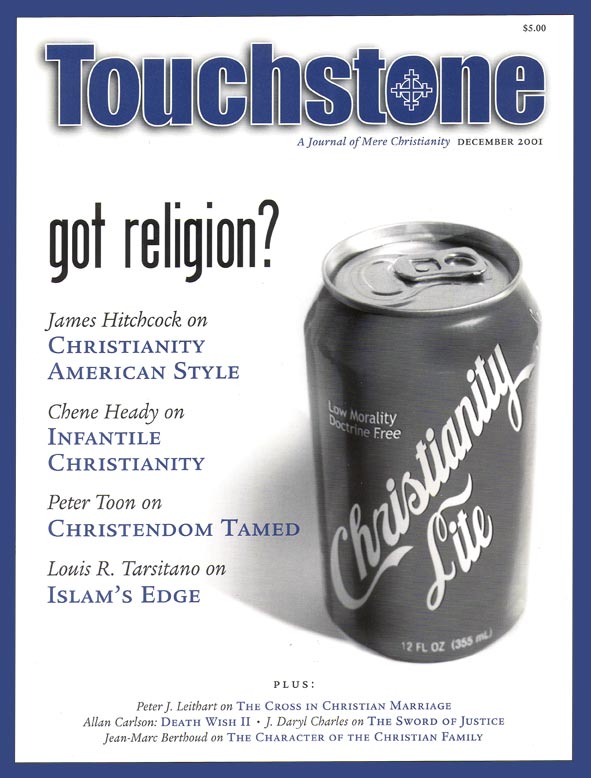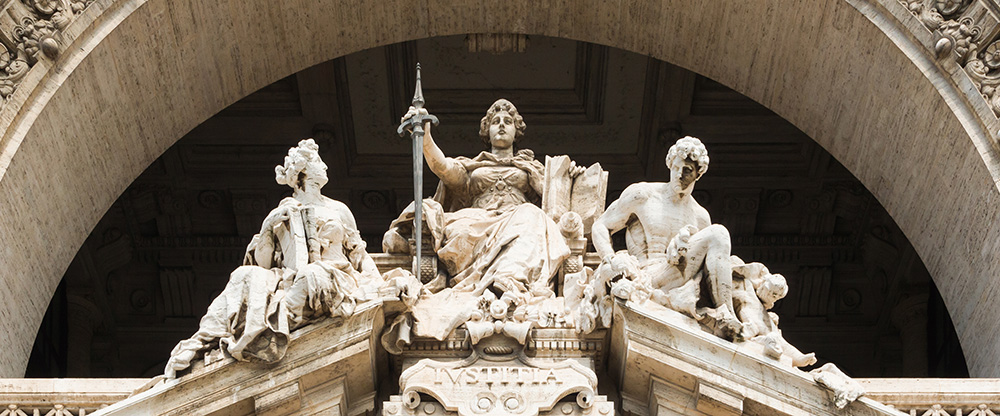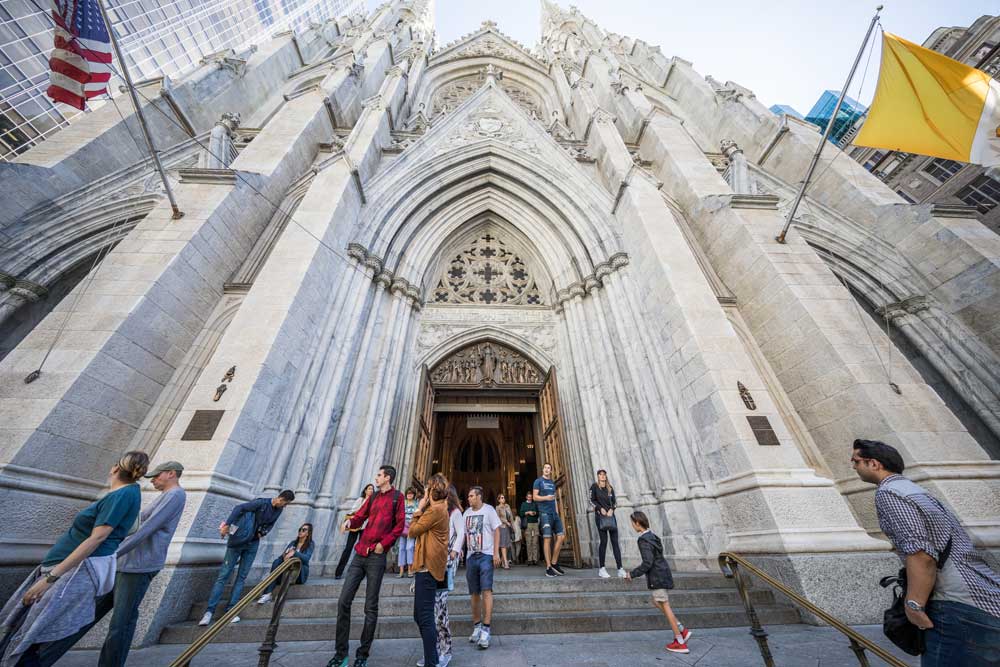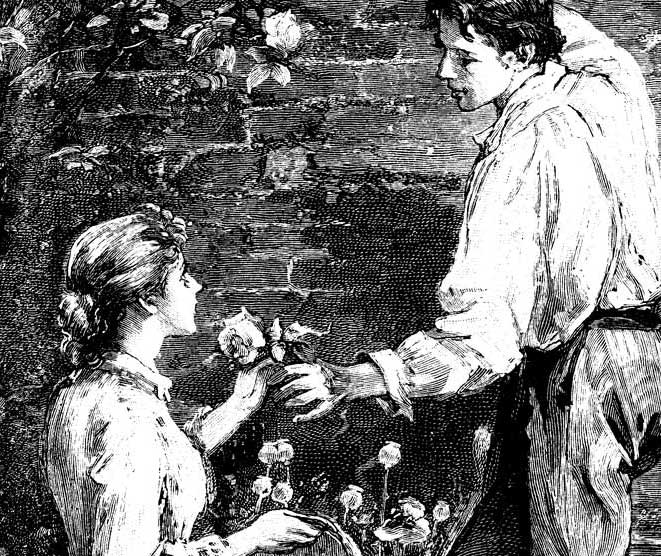Christianity American Style
The United States is by all measurable standards one of the most religious nations in the Western world, a finding surprising because in many ways it runs counter to almost everyone’s experience of a secular culture in which the claims of Christianity seem not even to be respected, much less heeded, in which religious influence seems to be on the wane. But in different ways both opinion polls and unsystematic experience are probably accurate.
Despite the buffetings traditional religion regularly receives, belief remains remarkably tenacious in America, and all claims that it is an atavistic and dying phenomenon have now been discredited. Indeed, the United States seems to be the great exception to the prevalent thesis that industrialization and urbanization always result in secularization.
The sources of this hardy religiosity are in some ways obscure, but from the very beginning of the country serious religious faith was part of the basic fabric of the culture, and religious ways of looking at reality have always come readily to the American mind, the Second Great Awakening after 1800 being the crucial instance.
In all opinion polls, Catholics show themselves to be more orthodox than liberal Protestants but less so than Evangelical Protestants, even extending to such questions as belief in God or in life after death. Catholics seem to have been harder hit by the corrosive secularism of the culture than have their Evangelical brethren.
Perhaps consistency ought not to be expected from mere human beings, but the apparent vitality of American Christianity raises alarms when popular beliefs are scrutinized. Thus, in one survey Christian adolescents ranked Jesus fifth on their list of most admired persons, after Lincoln, Washington, John F. Kennedy, and Martin Luther King, Jr., although Jesus did rank five places above Elvis Presley. Over 90 percent of Christians in Minnesota, according to one detailed ecumenical survey, believe in life after death, but only 69 percent think Jesus himself rose from the dead. American Christians have a measurably poorer knowledge of the Bible than did those of a generation ago.
While there are many forces in modern culture that are obviously hostile to orthodox religion, as far as popular faith is concerned, it seems that mere rationalism is not one of them. On the contrary, American Christians are often guilty of an excess of credulity, even of superstition. Thus, a quarter of all Catholics reportedly believe in reincarnation (once again, a higher percentage than among Protestants), while among adolescents over half believe in astrology, and more than a fourth in witchcraft.
The key to understanding all this is the hardly surprising fact that 71 percent of people believe in heaven, but only 53 percent believe in hell (the latter figure in fact surprisingly high). The orthodox belief that human beings survive after death is warmly accepted by believers primarily insofar as it promises personal happiness, not insofar as it threatens punishment. Despite their conviction that they will enjoy eternal life, about half of Christians disbelieve in the Last Judgment.
Over three-quarters of Christians say that they do not fear God, and the same proportion think he intervenes in their personal lives, but only in very “positive” and “supportive” ways. Spontaneous descriptions of God are varied—somewhat less than half of all believers see him as “master,” about a third as judge, creator, or redeemer, a fourth as friend, and a low proportion as father, mother, or liberator.
Given that the central teaching of the gospel is redemption from sin, perhaps the most significant index of the true state of American Christianity is that only about half of all believers think that they themselves are sinners, with the others preferring to say that they merely “err.” Only about half of Christians even think it is necessary to believe that human beings in general sin.
Three-quarters of all Christians think that people should arrive at their own beliefs independent of any religion. Asked to identify those things most important for the followers of Jesus, only half of American Christians named the Ten Commandments, and ten percent said “social justice,” whereas over three-quarters found that belief in Jesus increases one’s self-esteem. Somewhat over two-thirds of young Catholics say that doing God’s will is important, but they rank it the eleventh of seventeen values, lower than health, self-fulfillment, and education.
The obvious consistency in patterns of belief is that Americans tend to value religion insofar as they regard it as supportive of their personal lives but not when it seems to “interfere” in their lives and make demands on them. They are deeply religious in a sense, but their commitment proves fragile when it fails to provide the emotional support they seek. Not surprisingly, between 1950 and 1990 the proportion of Americans saying that religion was “very important” declined from 83 percent to barely half.
James Hitchcock is Professor emeritus of History at St. Louis University in St. Louis. He and his late wife Helen have four daughters. His most recent book is the two-volume work, The Supreme Court and Religion in American Life (Princeton University Press, 2004). He is a senior editor of Touchstone.
subscription options
Order
Print/Online Subscription

Get six issues (one year) of Touchstone PLUS full online access including pdf downloads for only $39.95. That's only $3.34 per month!
Order
Online Only
Subscription

Get a one-year full-access subscription to the Touchstone online archives for only $19.95. That's only $1.66 per month!
bulk subscriptions
Order Touchstone subscriptions in bulk and save $10 per sub! Each subscription includes 6 issues of Touchstone plus full online access to touchstonemag.com—including archives, videos, and pdf downloads of recent issues for only $29.95 each! Great for churches or study groups.
Transactions will be processed on a secure server.
more from the online archives
calling all readers
Please Donate
"There are magazines worth reading but few worth saving . . . Touchstone is just such a magazine."
—Alice von Hildebrand
"Here we do not concede one square millimeter of territory to falsehood, folly, contemporary sentimentality, or fashion. We speak the truth, and let God be our judge. . . . Touchstone is the one committedly Christian conservative journal."
—Anthony Esolen, Touchstone senior editor









